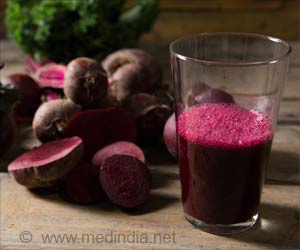- Beetroot juice reduces blood pressure levels within four weeks
- Inorganic dietary nitrate in beetroot juice dilates blood vessels, reducing pressure on the heart
- Consistent consumption is key to maintaining the blood pressure-lowering effects
A potential game-changer in the battle against hypertension is the beetroot juice, a recent study reveals. Researchers at Queen Mary University of London found that consuming a small amount of beetroot juice daily can significantly reduce blood pressure levels to a normal range within just four weeks. The findings, published in the journal Hypertension, have sparked excitement and hope for millions living with this silent killer (1✔ ✔Trusted Source
Functional properties of beetroot (Beta vulgaris) in management of cardio-metabolic diseases
).
Power of Beetroot: The Superfood
The magic ingredient behind beetroot’s blood pressure-lowering effects is inorganic dietary nitrate. This compound, abundant in beetroot, is converted into nitric oxide in the body. Nitric oxide helps to dilate blood vessels, reducing the pressure on the heart.
Beetroot juice can lower blood pressure by 8/4 mmHg in just four weeks! #beetrootjuice #hypertensionmanagement’
Professor Tim Spector, a leading expert in the field, has been a vocal supporter of beetroot’s health benefits. The study builds on previous research highlighting the vegetable’s potential to improve cardiovascular health.
Participants in the study consumed a daily dose of beetroot juice for four weeks. At the end of the trial, their blood pressure levels had dropped to within the normal range.
However, the benefits were found to be short-lived. When participants stopped drinking the beetroot juice, their blood pressure returned to its previous elevated levels. This suggests that consistent consumption is key to maintaining the blood pressure-lowering effects.
Combining Beetroot Juice with a Healthy Lifestyle for Optimal Hypertension Management
While beetroot juice has shown promising results, it’s important to note that it’s not a standalone solution for hypertension. A healthy lifestyle, including regular exercise, a balanced diet, and stress management, remains crucial for managing blood pressure.
Other nitrate-rich foods, such as leafy greens, fennel, and pumpkin, can also contribute to lowering blood pressure. Incorporating these foods into your diet can provide additional benefits for overall health.
Advertisement
Before making significant changes to your diet, it’s essential to consult with a healthcare professional. While beetroot juice is generally safe for most people, it may interact with certain medications. Additionally, individuals with specific health conditions may need to exercise caution.
The discovery of beetroot juice’s potential to combat hypertension is a significant step forward. However, further research is needed to fully understand its long-term effects and to explore other potential benefits. In the meantime, incorporating beetroot into your diet as part of a healthy lifestyle can be a positive addition to your blood pressure management plan.
Advertisement
Reference:
- Functional properties of beetroot (Beta vulgaris) in management of cardio-metabolic diseases – (https://www.ncbi.nlm.nih.gov/pmc/articles/PMC6947971/)
Source-Medindia









